National
WHAT A YEAR!
Our picks for the top national and international stories of 2013


(Washington Blade file photo by Michael Key)
It was perhaps the biggest year yet for the LGBT rights movement in the United States, as the Supreme Court made history by striking down Prop 8 and part of the Defense of Marriage Act. More states legalized marriage in its wake. Elsewhere in the world, the Catholic Church got a new pope who seemed to break with his predecessor over gay rights, among other issues.
Here are the Blade staff’s picks for the year’s top 10 national and international stories.
#1 Supreme Court strikes down DOMA, Prop 8
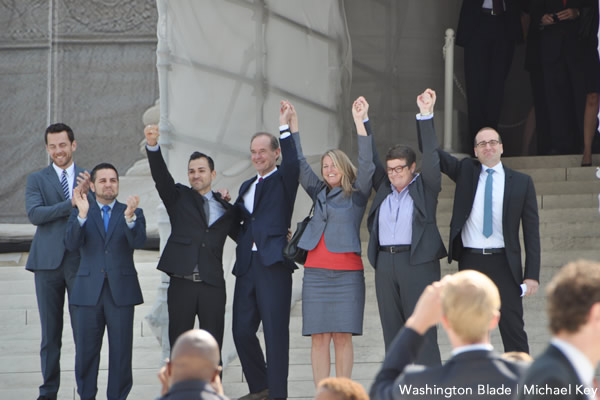
The plaintiffs in the Proposition 8 case at the Supreme Court emerge victorious with lawyer David Boies, Human Rights Campaign President Chad Griffin and American Foundation for Equal Rights Executive Director Adam Umhoefer. (Washington Blade file photo by Michael Key)
The U.S. Supreme Court issued a pair of historic decisions against the Defense of Marriage Act and California’s Proposition 8 in a news event we have dubbed the story of the year.
In a 5-4 decision, the court struck down Section 3 of DOMA, the 1996 Clinton-era law that prohibited the federal government from recognizing same-sex marriage. In a separate 5-4 decision issued at the same time, the court ruled the proponents of Prop 8 couldn’t defend the initiative in court, allowing a district court ruling to stand that determined the 2008 amendment was unconstitutional.
Writing for the majority in the decision against DOMA, U.S. Associate Justice Anthony Kennedy emphasized the harm the anti-gay law causes married same-sex couples.
“The federal statute is invalid, for no legitimate purpose overcomes the purpose and effect to disparage and to injure those whom the State, by its marriage laws, sought to protect in personhood and dignity,” Kennedy wrote. “By seeking to displace this protection and treating those persons as living in marriages less respected than others, the federal statute is in violation of the Fifth Amendment.”
The DOMA lawsuit was brought by New York widow Edith Windsor as a result of having to pay $363,000 in estate taxes in 2009 upon the death of her spouse, Thea Spyer. Windsor became a symbol of the marriage equality movement and was named by Time magazine as its No. 3 pick for “Person of the Year” after her victory at the Supreme Court.
The ruling against Prop 8 restored marriage equality to California. Thousands of same-sex couples — beginning with plaintiffs Kris Perry and Sandra Stier, who were wed by California Attorney General Kamala Harris at San Francisco City Hall — began to marry after the U.S. Ninth Circuit Court of Appeals gave the go-ahead weeks after the decision.
Immediately after the ruling against DOMA, the Obama administration pledged to work toward implementing the decision to allow for the recognition of same-sex marriage by the federal government. At a news conference during a trip to Africa, President Obama pledged to make the federal benefits of marriage as widely available as possible.
“It’s my personal belief — but I’m speaking now as a president as opposed to as a lawyer — that if you’ve been married in Massachusetts and you move someplace else, you’re still married, and that under federal law you should be able to obtain the benefits of any lawfully married couple,” Obama said.
Then-Secretary of Homeland Security Janet Napolitano issued guidance saying bi-national same-sex couples would be able to apply for marriage-based green cards to enable them to stay in the United States. The U.S. Office of Personnel Management announced that spousal benefits, including health and pension benefits, would begin to flow to gay federal employees. Perhaps most significantly, the Internal Revenue Service announced it would recognize the marriages of same-sex couples for tax purposes — even if they file tax returns while living in a non-marriage equality state.
Defense Secretary Chuck Hagel also announced that service members in same-sex marriages would be able to receive spousal benefits, including health, pension and housing benefits. Several national guards with state constitutional amendments banning same-sex marriage said they would be unable to process these benefits, but after a second edict from Hagel saying they must comply, each of those states fell in line.
Within a few short months, the ruling against DOMA also helped accelerate the path toward marriage equality throughout individual states. In Ohio, a federal judge recognized the marriage of a same-sex couple that married at BWI airport because one of the partners in the relationship was dying of Lou Gehrig’s disease. Later, a New Jersey superior court ruled the state’s civil union law was insufficient — a decision the State Supreme Court let stand upon appeal from New Jersey Gov. Chris Christie, who later the dropped the lawsuit.
Doug NeJaime, a gay law professor at the University of California, Irvine, said this movement so soon after the Windsor ruling “was anticipated” given the language that Associate Justice Anthony Kennedy used in his opinion.
“Given the flurry of activity, and the quick decisions coming out of places like Ohio, this may mean that the Supreme Court may not be able to avoid the question regarding the constitutionality of state marriage bans as long as some of the justices may hope,” NeJaime said.
#2 States, countries extend marriage rights
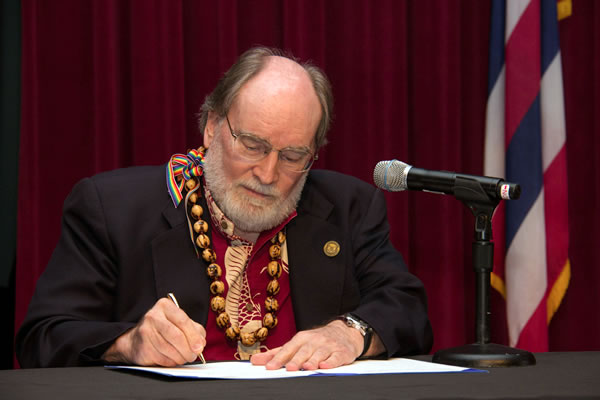
Hawaii Gov. Neil Abercrombie on Nov. 13, 2013, signed his state’s same-sex marriage bill into law. (Photo courtesy of State of Hawaii/Office of the Governor)
The movement for marriage rights for same-sex couples made significant advances in the U.S. and around the world in 2013.
In addition to Maryland and Delaware, gays and lesbians began to legally marry in California, Rhode Island, New Jersey, Minnesota and Hawaii. Illinois’s same-sex marriage law that Gov. Pat Quinn signed last month will take effect in June.
New Zealand and Uruguay also extended marriage rights to same-sex couples in 2013.
Brazil’s National Council of Justice in May nearly unanimously ruled that registrars in the South American country cannot deny marriage licenses to same-sex couples.
Gays and lesbians in England and Wales on March 29 will begin to exchange vows after the British Parliament over the summer approved a same-sex marriage bill. An identical measure cleared its first hurdle in the Scottish Parliament last month.
The legal process to extend marriage rights to same-sex couples in Mexico continued to gain ground in Baja California, Guanajuato, Jalisco and other states in 2013. A handful of gays and lesbians have exchanged vows in Colombia, but the country’s attorney general has challenged some of them.
Croatian voters on Dec. 1 approved a constitutional amendment that defines marriage as between a man and a woman. The Australia High Court on Dec. 11 ruled a law that extended marriage rights to same-sex couples in the country’s capital is unconstitutional.
#3 Senate passes ENDA; House version stalls
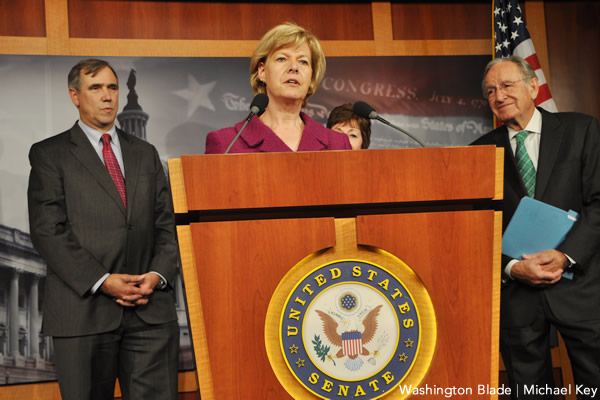
Sen. Tammy Baldwin (D-Wis.) spoke in a press conference following the passage of the Employment Non-Discrimination Act in the U.S. Senate. (Washington Blade photo by Michael Key).
For the first time in history, the U.S. Senate approved with bipartisan support this year a long sought piece of legislation that would bar employers from discriminating against or firing workers based on their sexual orientation or gender identity.
By a vote of 64-32, the Employment Non-Discrimination Act passed the Senate, marking the first time that either chamber of Congress has passed a version of the bill with protections for transgender workers. A total of 10 Republicans joined the entire Democratic caucus present in voting for the bill.
Prior to the vote, Sen. Jeff Merkley (D-Ore.), ENDA’s chief sponsor, delivered a speech on the Senate floor recognizing the historic nature of the moment.
“I look forward to this vote, this vote for liberty, this vote for freedom, this vote for opportunity, this vote for a fair and just America,” Merkley said.
Despite a push to bring up the legislation in the House, momentum on ENDA seems to have stalled as the legislation has capped out at 201 sponsors and House Speaker John Boehner (R-Ohio) has continually said he opposes it.
“I understand people have differing opinions on this issue, and I respect those opinions,” Boehner said in response to a question from the Washington Blade. “But as someone who’s worked in the employment law area for all my years in the State House and all my years here, I see no basis or no need for this legislation.”
#4 Russia’s LGBT crackdown sparks outrage
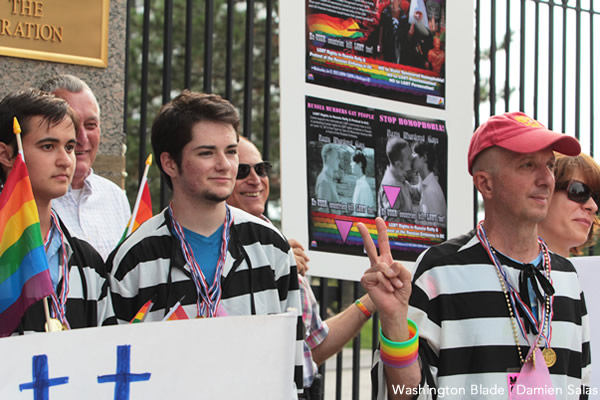
Activists protested in front of the Russian embassy several times throughout the year following the passage of anti-gay laws in the country. (Washington Blade photo by Damien Salas)
The Kremlin’s LGBT rights crackdown sparked widespread outrage this past year amid preparations for the 2014 Winter Olympics that will take place in Sochi, Russia, in February.
Russian President Vladimir Putin in June signed a broadly worded bill into law that bans gay propaganda to minors. A second statute that bans foreign same-sex couples and any couple from a country in which gays and lesbians can marry from adopting Russian children took effect in July.
LGBT rights groups and other organizations that receive funding from outside Russia could face a fine if they don’t register as a “foreign agent.”
“These laws are aimed at driving LGBT people back into silence, back underground, back to the invisibility,” Polina Andrianova of Coming Out, a St. Petersburg-based LGBT advocacy group, told the Washington Blade during an August interview.
Playwright Harvey Fierstein is among those who have called for a boycott of the Sochi games in response to Russia’s LGBT rights crackdown. The International Olympic Committee and the U.S. Olympic Committee have also faced criticism from those who feel they have not done enough to publicly criticize the Kremlin over the gay propaganda law.
“The U.S. Olympic Committee has been complicit in this act of aggression because they say we respect Russia’s right to do this,” U.S. Rep. Ileana Ros-Lehtinen (R-Fla.) told the Washington Blade in late September before the USOC added sexual orientation to its anti-discrimination policy. “That is not worthy of Olympic standards.”
Retired Olympic diver Greg Louganis on Dec. 13 told the Blade that gay MSNBC anchor Thomas Roberts should not have co-hosted the Miss Universe 2013 pageant in November in Moscow. The four-time gold medalist also said gay singer Elton John should not have performed in Russia earlier this month.
“It just seems like all they’re doing is lending credibility to what’s going on there,” said Louganis.
#5 LGBT Catholics welcome Pope Francis

‘If a person is gay and seeks the Lord and is of good will, who am I to judge him,’ said Pope Francis. (Photo by Agência Brasil; courtesy Wikimedia Commons)
LGBT Catholics in 2013 welcomed Pope Francis’ more moderate tone toward gays.
The College of Cardinals on March 16 elected the former archbishop of Buenos Aires to succeed Pope Benedict XVI who abruptly resigned in February.
The Argentine pontiff said during a September interview with an Italian Jesuit newspaper that the Roman Catholic church has grown “obsessed” with nuptials for gays and lesbians, abortion and contraception. These comments came roughly two months after he told reporters as he returned to Rome after a weeklong trip to Brazil that gays and lesbians should not be judged or marginalized.
“If a person is gay and seeks the Lord and is of good will, who am I to judge him?” said Francis in response to a question about gay priests.
LGBT rights advocates in Argentina noted to the Washington Blade the pontiff categorized the same-sex marriage bill the country’s president, Cristina Fernández de Kirchner, signed in 2010 as “the work of the devil” that would “spark God’s war.”
Dignity USA Executive Director Marianne Duddy-Burke acknowledged Francis’ anti-LGBT statements after his election. She remains optimistic the new pontiff will welcome LGBT Catholics back into the church.
“We find much to be hopeful about, particularly in the Pope’s firm desire that the church be a ‘home for all people,’ and his belief that God looks on lesbian, gay, bisexual and transgender people with love rather than condemnation,” said Duddy-Burke in a September statement.
#6 Obama names gay ambassadors, judges
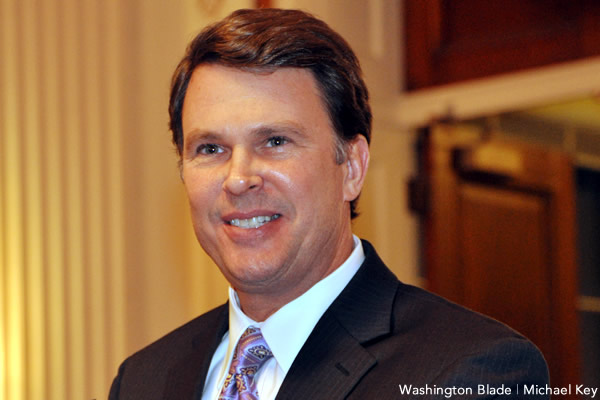
John Berry was named U.S. Ambassador to Australia. (Washington Blade file photo by Michael Key)
The U.S. Senate approved this year several openly gay appointees — including the first openly gay federal appeals judge — in confirmations that were historic both in number and significance.
Among the confirmed appointees were five openly gay ambassadors, including former U.S. Office of Personnel Management Director John Berry as U.S. ambassador to Australia. The confirmation made him the first openly gay U.S. ambassador to a G-20 country.
Also among the gay confirmations were Daniel Baer as U.S. ambassador to Organization for Security & Cooperation in Europe; Rufus Gifford as U.S. ambassador to Denmark; James Costos as U.S. ambassador to Spain; and James “Wally” Brewster as U.S. ambassador to the Dominican Republic.
Additionally, the Senate confirmed Eric Fanning as under secretary of the Air Force. After the departure of his immediate boss shortly after the confirmation, Fanning became acting secretary of the Air Force, making him the highest-ranking openly gay civilian in the U.S. military.
Chai Feldblum, the lesbian member of the U.S. Equal Employment Opportunity Commission, was confirmed for a second term after leading the way for a ruling instituting transgender workplace non-discrimination protections.
The Senate also confirmed openly gay judicial nominees. The highest-ranking among them was Todd Hughes, who was confirmed as circuit judge for the U.S. Court of Appeals for the Federal Circuit. He’s the first openly gay person to serve a federal appeals court.
The other confirmations were Pamela Ki Mai Chen as U.S. District Judge for the Eastern District of New York; Michael McShane as U.S. District Judge for the District of Oregon; and Nitza Quiñones Alejandro as U.S. District Judge for the Eastern District of Pennsylvania.
#7 Trans protections recognized under Title IX
The Obama administration made a historic ruling for transgender rights this year by applying existing law to protect students in school on the basis of their gender identity.
The Departments of Education and Justice announced the resolution as a result of a complaint filed by the National Center for Lesbian Rights on behalf of a transgender student in California’s Arcadia Unified School District. The resolution requires the school district to treat the student as male in all respects and keep his transgender status private.
NCLR Staff Attorney Asaf Orr commended the Obama administration for taking the step “to ensure that schools are safe and supportive environments where all students can thrive, including transgender students.”
The resolution represents a growing legal and administrative trend to interpret existing law — in this case, Title IX of the Education Act of 1972 — to ban discrimination against trans people.
Prior to the ruling, the student was required to sleep in a cabin by himself on an overnight field trip instead of being allowed to room with his male peers. The school district also excluded the student from the boys’ restroom and locker room, insisting that he use the nurse’s office.
The student, who remained anonymous, said he’s glad his school district agreed to put in place the resolution proposed by the Obama administration.
“Knowing that I have the school district’s support, I can focus on learning and being a typical high school student, like my friends,” the student said.
#8 Obama references Stonewall in inaugural speech

In a first, President Obama made two references to gay rights during his inaugural address in January. (Washington Blade file photo by Michael Key)
President Obama stirred passions in the LGBT community by making an unprecedented reference to LGBT rights during his second-term inaugural address and saying he believes gay people deserve equal treatment under the law.
“Our journey is not complete until our gay brothers and sisters are treated like anyone else under the law – for if we are truly created equal, then surely the love we commit to one another must be equal as well,” Obama said.
The words marked the first time that any U.S. president mentioned gay rights during an inaugural address and sent shockwaves through the LGBT community.
Also during the speech, Obama made a reference to the 1969 Stonewall riots, which are considered the start of the modern LGBT rights movement.
“We, the people, declare today that the most evident of truths – that all of us are created equal – is the star that guides us still; just as it guided our forebears through Seneca Falls, and Selma, and Stonewall; just as it guided all those men and women, sung and unsung, who left footprints along this great Mall, to hear a preacher say that we cannot walk alone; to hear a King proclaim that our individual freedom is inextricably bound to the freedom of every soul on Earth,” Obama said.
#9: Gay mayors in Seattle, Houston; Quinn loses in New York
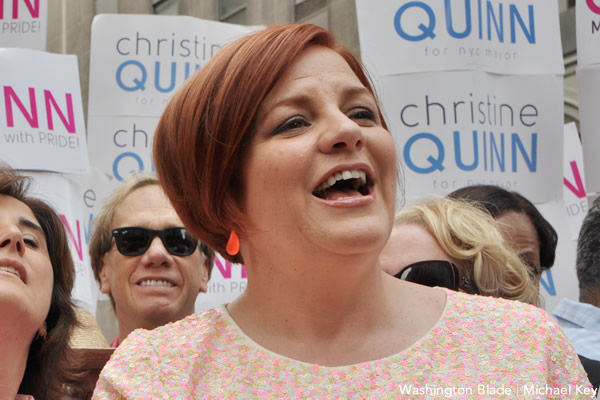
Lesbian Christine Quinn started her mayoral campaign a heavy favorite but ultimately lost in New York’s primary. (Washington Blade photo by Michael Key)
Lesbian Annise Parker won election to her third and final term as mayor of Houston, on Nov. 5, receiving a decisive 57 percent of the vote in a nine-candidate race.
In Seattle, Washington State Sen. Ed Murray defeated incumbent Mayor Mike McGinn by a margin of 56 percent to 43 percent to become that city’s first openly gay mayor.
And in Atlantic City, N.J., gay Republican Don Guardian shook up the political establishment by winning an upset victory over incumbent Mayor Lorenzo Langford, a Democrat, in a city where Democrats outnumber Republicans among registered voters by a nine to one margin. Guardian ran as a socially progressive reform candidate with a record as a highly competent administrator of services for the city’s tourist district.
Meanwhile, New York City Council Speaker Christine Quinn lost her race to become New York’s first openly gay and first female mayor, finishing third in a hotly contested Democratic primary in September. A New York Times exit poll showed pro-LGBT candidate Bill deBlasio, who won the primary and the general election in November, beat Quinn among LGBT voters by a margin of 47 percent to 34 percent in a four candidate race.
Most political observers said LGBT voters joined the majority of their straight counterparts in backing deBlasio, who emerged as more progressive on economic issues than Quinn and who was perceived as an outspoken critic of incumbent Mayor Michael Bloomberg, who is highly unpopular among Democratic voters. Quinn had long been viewed as a Bloomberg ally.
# 10 Manning gets 35 years, comes out as trans

Manning announced she is transitioning one day after being sentenced for leaking classified documents. (Public domain photo)
One day after a military judge sentenced former U.S. Army Private Bradley Manning to 35 years in prison for leaking classified documents to Wikileaks, the 25-year-old soldier released a statement through her attorney coming out as transgender.
“As I transition into this next phase of my life, I want everyone to know the real me,” Manning said. “I am Chelsea Manning. I am a female.”
Manning’s dramatic announcement shifted the media focus from that of her conviction in an Army court martial proceeding of violating the U.S. Espionage Act for leaking an unprecedented amount of classified information to the issue of who transgender people are and whether they should be entitled to equal rights.
Some transgender rights advocates said Manning’s case would hurt efforts to lift the military’s ban on transgender service members by casting transgender people in a negative light. Transgender activists Brynn Tannehill and Autumn Sandeen, who served in the military before transitioning, said they were especially troubled by arguments by Manning’s attorney that Manning’s struggle over her gender identity created stress that played some role in her decision to leak classified information.
“In my last four years in the Navy I was grappling with gender identity yet I did my job” and didn’t release classified information,” Sandeen said.
By Lou Chibbaro Jr., Chris Johnson and Michael Lavers
U.S. Supreme Court
Supreme Court to consider bans on trans athletes in school sports
27 states have passed laws limiting participation in athletics programs

The U.S. Supreme Court on Thursday agreed to hear two cases involving transgender youth challenging bans prohibiting them from participating in school sports.
In Little v. Hecox, plaintiffs represented by the ACLU, Legal Voice, and the law firm Cooley are challenging Idaho’s 2020 ban, which requires sex testing to adjudicate questions of an athlete’s eligibility.
The 9th U.S. Circuit Court of Appeals described the process in a 2023 decision halting the policy’s enforcement pending an outcome in the litigation. The “sex dispute verification process, whereby any individual can ‘dispute’ the sex of any female student athlete in the state of Idaho,” the court wrote, would “require her to undergo intrusive medical procedures to verify her sex, including gynecological exams.”
In West Virginia v. B.P.J., Lambda Legal, the ACLU, the ACLU of West Virginia, and Cooley are representing a trans middle school student challenging the Mountain State’s 2021 ban on trans athletes.
The plaintiff was participating in cross country when the law was passed, taking puberty blockers that would have significantly reduced the chances that she could have a physiological advantage over cisgender peers.
“Like any other educational program, school athletic programs should be accessible for everyone regardless of their sex or transgender status,” said Joshua Block, senior counsel for the ACLU’s LGBTQ and HIV Project. “Trans kids play sports for the same reasons their peers do — to learn perseverance, dedication, teamwork, and to simply have fun with their friends,” Block said.
He added, “Categorically excluding kids from school sports just because they are transgender will only make our schools less safe and more hurtful places for all youth. We believe the lower courts were right to block these discriminatory laws, and we will continue to defend the freedom of all kids to play.”
“Our client just wants to play sports with her friends and peers,” said Lambda Legal Senior Counsel Tara Borelli. “Everyone understands the value of participating in team athletics, for fitness, leadership, socialization, and myriad other benefits.”
Borelli continued, “The U.S. Court of Appeals for the Fourth Circuit last April issued a thoughtful and thorough ruling allowing B.P.J. to continue participating in track events. That well-reasoned decision should stand the test of time, and we stand ready to defend it.”
Shortly after taking control of both legislative chambers, Republican members of Congress tried — unsuccessfully — to pass a national ban like those now enforced in 27 states since 2020.
Federal Government
UPenn erases Lia Thomas’s records as part of settlement with White House
University agreed to ban trans women from women’s sports teams

In a settlement with the Trump-Vance administration announced on Tuesday, the University of Pennsylvania will ban transgender athletes from competing and erase swimming records set by transgender former student Lia Thomas.
The U.S. Department of Education’s Office for Civil Rights found the university in violation of Title IX, the federal rights law barring sex based discrimination in educational institutions, by “permitting males to compete in women’s intercollegiate athletics and to occupy women-only intimate facilities.”
The statement issued by University of Pennsylvania President J. Larry Jameson highlighted how the law’s interpretation was changed substantially under President Donald Trump’s second term.
“The Department of Education OCR investigated the participation of one transgender athlete on the women’s swimming team three years ago, during the 2021-2022 swim season,” he wrote. “At that time, Penn was in compliance with NCAA eligibility rules and Title IX as then interpreted.”
Jameson continued, “Penn has always followed — and continues to follow — Title IX and the applicable policy of the NCAA regarding transgender athletes. NCAA eligibility rules changed in February 2025 with Executive Orders 14168 and 14201 and Penn will continue to adhere to these new rules.”
Writing that “we acknowledge that some student-athletes were disadvantaged by these rules” in place while Thomas was allowed to compete, the university president added, “We recognize this and will apologize to those who experienced a competitive disadvantage or experienced anxiety because of the policies in effect at the time.”
“Today’s resolution agreement with UPenn is yet another example of the Trump effect in action,” Education Secretary Linda McMahon said in a statement. “Thanks to the leadership of President Trump, UPenn has agreed both to apologize for its past Title IX violations and to ensure that women’s sports are protected at the university for future generations of female athletes.”
Under former President Joe Biden, the department’s Office of Civil Rights sought to protect against anti-LGBTQ discrimination in education, bringing investigations and enforcement actions in cases where school officials might, for example, require trans students to use restrooms and facilities consistent with their birth sex or fail to respond to peer harassment over their gender identity.
Much of the legal reasoning behind the Biden-Harris administration’s positions extended from the 2020 U.S. Supreme Court case Bostock v. Clayton County, which found that sex-based discrimination includes that which is based on sexual orientation or gender identity under Title VII rules covering employment practices.
The Trump-Vance administration last week put the state of California on notice that its trans athlete policies were, or once were, in violation of Title IX, which comes amid the ongoing battle with Maine over the same issue.
New York
Two teens shot steps from Stonewall Inn after NYC Pride parade
One of the victims remains in critical condition

On Sunday night, following the annual NYC Pride March, two girls were shot in Sheridan Square, feet away from the historic Stonewall Inn.
According to an NYPD report, the two girls, aged 16 and 17, were shot around 10:15 p.m. as Pride festivities began to wind down. The 16-year-old was struck in the head and, according to police sources, is said to be in critical condition, while the 17-year-old was said to be in stable condition.
The Washington Blade confirmed with the NYPD the details from the police reports and learned no arrests had been made as of noon Monday.
The shooting took place in the Greenwich Village neighborhood of Manhattan, mere feet away from the most famous gay bar in the city — if not the world — the Stonewall Inn. Earlier that day, hundreds of thousands of people marched down Christopher Street to celebrate 55 years of LGBTQ people standing up for their rights.
In June 1969, after police raided the Stonewall Inn, members of the LGBTQ community pushed back, sparking what became known as the Stonewall riots. Over the course of two days, LGBTQ New Yorkers protested the discriminatory policing of queer spaces across the city and mobilized to speak out — and throw bottles if need be — at officers attempting to suppress their existence.
The following year, LGBTQ people returned to the Stonewall Inn and marched through the same streets where queer New Yorkers had been arrested, marking the first “Gay Pride March” in history and declaring that LGBTQ people were not going anywhere.
New York State Assemblywoman Deborah Glick, whose district includes Greenwich Village, took to social media to comment on the shooting.
“After decades of peaceful Pride celebrations — this year gun fire and two people shot near the Stonewall Inn is a reminder that gun violence is everywhere,” the lesbian lawmaker said on X. “Guns are a problem despite the NRA BS.”


















